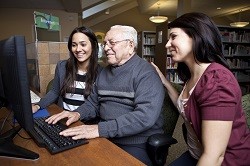Staying young
The EC-funded BETTER-AGEING project concentrated on the study of the causes that lead to muscoskeletal frailty in the elderly and ways to avoid it. One of the specific areas of interest was skeletal muscle weakness. Project partner, University of Pavia, addressed a series of aspects relating to causes of muscle weakness. Researchers aimed to discern whether muscle weakness is attributable to shifts in fibre composition, a decrease in myofibrillar protein content or a change in fibre functional properties. Finally, the impact of training on single muscle fibre properties was also examined. Results showed that level of activity is indeed a crucial factor in how muscle fibres age. Long-duration training can have a positive impact on force and velocity of muscle fibres in the elderly. Specifically, long-duration training of moderate intensity can increase force and velocity of muscle fibres independently from a change in fibre type in young and elderly subjects. Essentially, training could be seen to reverse the effects of ageing on muscle structure. These data indicate that physical training remains an important health aspect, not just for the young, but for the elderly too. Further research could provide valuable insight into how the elderly can be protected from the physical deterioration that usually accompanies ageing.







